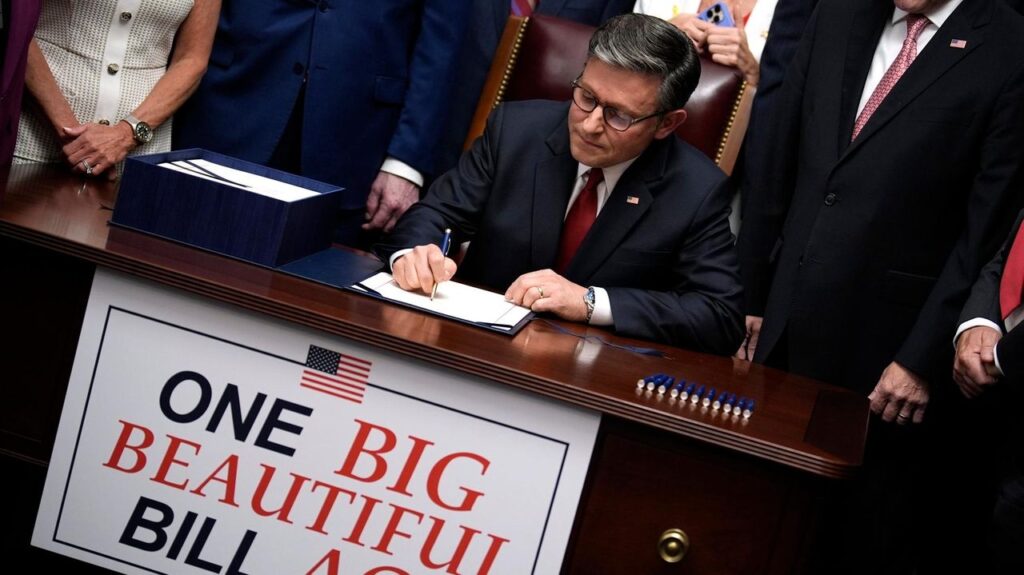
WASHINGTON — Midway through his first year back in office, President Donald Trump has secured approval from the Republican-majority Congress to advance significant components of his domestic agenda. The expansive budget bill passed by Congress this week is poised to affect Long Island in multiple ways, from economic shifts to environmental changes, health care access, and immigration enforcement. This legislation is expected to be a focal point in next year’s midterm elections, according to Lawrence Levy, executive dean of Hofstra University’s National Center for Suburban Studies.
“On Long Island, the messaging battle will take place over SALT,” Levy noted, referring to the state and local tax deduction cap, which was initially set at $10,000 by the Republican congressional majority in 2017 and has now been increased to $40,000 under the current bill. “Who wins will not only depend on media skill and money raising, but on how the economy is doing and how much people feel the pinch of the caps compared to everything else going on in their economic lives,” he added.
Economic Implications of the Budget Bill
The cornerstone of this legislative package is the extension of the 2017 tax cuts, originally set to expire at the end of this year. The current bill makes most of these cuts permanent and introduces new temporary provisions, including an increase in the SALT deduction cap to $40,000 for households earning $500,000 or less over the next five years, after which it will revert to the $10,000 cap.
Matt Cohen, president and CEO of the Long Island Association, commended Representatives Andrew Garbarino and Nick LaLota for their efforts in negotiating this increase amid opposition. However, he expressed caution regarding the long-term impacts of the overall bill on Long Island.
“The reinstatement of SALT has been the holy grail for Long Islanders and kudos to Congressmen Garbarino and LaLota for delivering significant changes to it which will impact many more taxpayers, jolt our economy, and make our region more affordable,” Cohen stated. “While other provisions of the bill like making permanent a small business tax deduction will benefit us here, we are examining how the legislation will impact health care, renewable energy, food security, and the national deficit.”
While the White House argues that these tax cuts will boost domestic spending and spur business growth, various economic studies suggest that the package will add $3.4 trillion to the national debt by 2034, potentially slowing long-term economic growth. A recent analysis by the Yale Budget Lab concluded,
“There are few provisions that would drive economic growth in the long run as opposed to simply running up debt and generating upward pressure on interest rates.”
Health Care Challenges Ahead
The budget bill also introduces significant changes to health care, with hundreds of thousands of New Yorkers potentially losing access to coverage due to revised Medicaid eligibility requirements and changes to Affordable Care Act enrollment. New York stands to lose $120 billion in federal Medicaid funding over the next decade, as states that expanded Medicaid under the ACA are expected to shoulder a larger share of costs.
In Suffolk and Nassau counties, hundreds of thousands of individuals are enrolled in Medicaid, and the potential loss of coverage could have a profound impact. Kenneth E. Raske, president of the Greater New York Hospital Association, projected major cuts to services and jobs, with 1.5 million New Yorkers potentially losing health care coverage.
“Cutting health insurance eligibility doesn’t stop people from getting sick and ultimately going to the hospital, but it does skyrocket hospitals’ uncompensated care costs,” Raske warned.
The nonpartisan Congressional Budget Office estimates that more than 11.8 million Americans could lose access to health care by 2034 under the bill’s provisions.
Environmental and Immigration Repercussions
The bill also impacts environmental policies by phasing out Biden-era clean energy tax credits, which were designed to promote solar panels, wind energy, and electric vehicles. Local environmental advocates express concern that this could slow growth in Long Island’s clean energy sector. Tax credits for electric vehicles and residential solar panels are set to end soon, potentially affecting middle to low-income homeowners who have relied on these incentives to reduce energy costs.
“On Long Island, we have very high electric costs, so the people who have been using all these tax breaks are low- to moderate-income people,” said Adrienne Esposito, executive director of the Citizens Campaign for the Environment.
Meanwhile, immigration enforcement remains a contentious issue. The bill allocates $100 billion through 2029 to expand the U.S. Immigration and Customs Enforcement agency, making it the largest law enforcement body in the country. This includes substantial funding for detention facilities, border security efforts, and deportations. Lawrence Levy pointed out that while this could bolster Republican support among Trump’s base, it risks alienating moderate swing voters.
“The way that U.S. Immigration and Customs Enforcement has carried out its orders has turned off a lot of people, particularly political independents and moderates, who are the swing vote in this country,” Levy explained.
As the effects of this budget bill unfold, its impact on Long Island and the broader national landscape will be closely monitored, with significant implications for the upcoming midterm elections.






